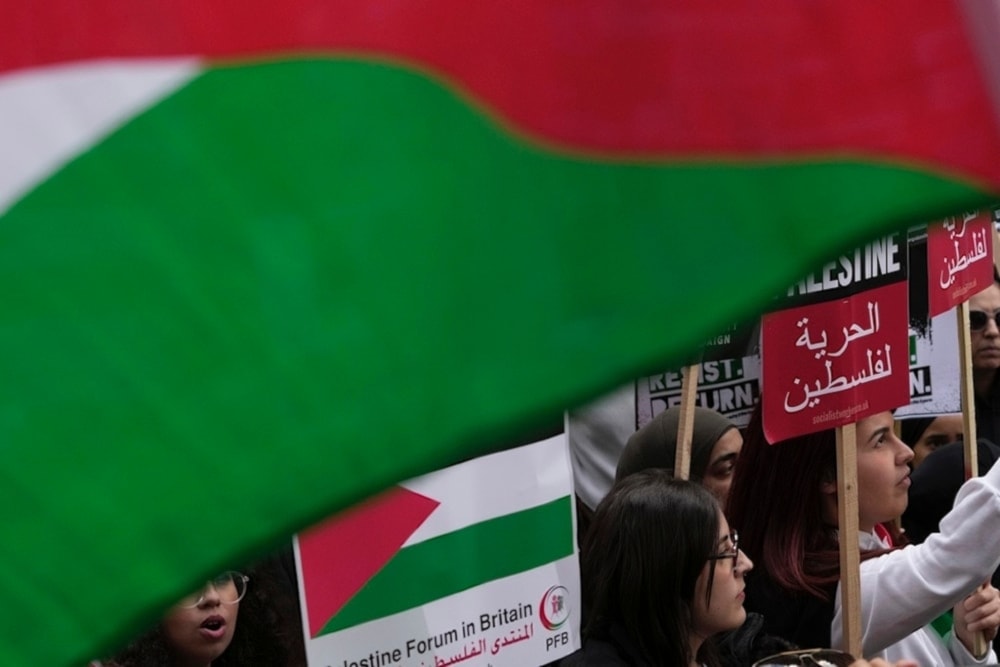King’s College leads London in divesting from Israeli arms suppliers
King’s College London (KCL) has made a significant move by becoming the first college in the British capital to divest from companies supplying arms and military equipment to "Israel".
-

Students march during a pro-Palestinian demonstration in London, on Saturday, Oct 14, 2023. (AP)
King’s College London (KCL) has become the first college in the British capital to divest from companies that supply arms and military equipment to "Israel", which has been conducting a genocide against Palestinians in the Gaza Strip for the past ten months.
Facing pressure from pro-Palestine student protests and a growing anti-war sentiment across the United Kingdom and globally, KCL has decided to cease investments in companies involved in manufacturing cluster bombs, land mines, and depleted uranium weapons used by Israeli occupation forces.
Hassan Ali, the vice president of welfare and community at King’s College London Students’ Union, said, “I am pleased to announce that after a series of extensive negotiations, we have reached an agreement with King’s College London to revive their investment policy in arms companies in light of the genocide taking place in Palestine.”
Ali, along with Sadaf Cheema and Alizeh Abrar, was suspended for five months starting in December due to their support for Gaza and involvement in the student campaign for Gaza solidarity.
The divestment means KCL will cease all direct investments in companies, such as Lockheed Martin, L3Harris Technologies, and Boeing. These companies are major military suppliers to "Israel", producing cluster bombs, land mines, depleted uranium weapons, and other armaments.
“The university will no longer invest in companies engaged in the production or distribution of controversial weapons,” he stressed.
According to Ali, KCL’s finance executives have approved the policy change and begun its implementation.
He added that the agreement will be finalized and officially announced in October during the next investment committee meeting.
Dive deeper
Earlier this week, The Times reported that KCL will cease investments in "controversial" arms following student protests in solidarity with Palestinians in the Gaza Strip. The university is revising its investment policy after students accused it of being "complicit in genocide" during "Israel’s" prolonged aggression against the blockaded enclave.
Under the "Controversial Weapons" clause in KCL’s Environment, Social, and Governance framework, a new paragraph will be added specifying that the university will "not hold any direct or indirect (via pooled funds) investments in companies deemed to be engaged in controversial weapons," the report stated on Wednesday.
Ali mentioned that divesting from companies involved in "Israel’s" arms manufacturing was one of three demands made by students to KCL leaders.
The other two demands included asking KCL to aid in the reconstruction of educational institutions in Gaza and to end indirect investments in banks and financial institutions that support "Israel".
Ali also mentioned that divesting from companies involved in "Israel’s" arms manufacturing was one of three requests made by students to KCL leaders. The other two requests were for KCL to help rebuild educational institutions in Gaza and to stop indirect investments in banks and financial institutions supporting the Israeli government.
“My analysis is that, in addition to halting direct investments, which we have achieved, KCL will agree on helping to rebuild Gaza’s educational institutions, but pushing the university to halt indirect investments will be difficult,” he further stressed.
It is worth noting that hundreds of student protests and solidarity camps have emerged in response to "Israel’s" 10-month-long genocide in Gaza, with over 36 taking place in the UK alone.
Last week, Cambridge University announced it would reconsider its position on “responsible investment” after a prolonged student protest in support of Palestinians on campus. The university cited appeals from the student union as a catalyst for reviewing whether its investment policy aligns with its institutional values.
Last month, students at Swansea University successfully persuaded the institution to divest £5 million from Barclays, a UK banking giant known for investing billions in arms companies that supply weapons and military technology to Tel Aviv.

 4 Min Read
4 Min Read










